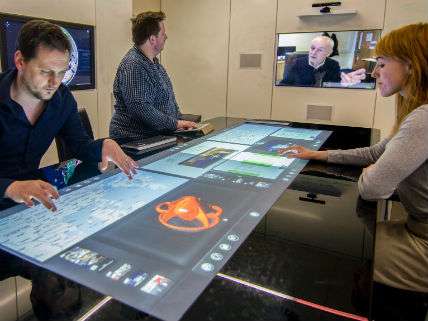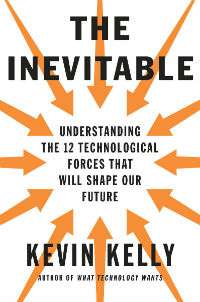Is Technological Progress Unstoppable?
A new book by a Wired senior editor makes the case

The Inevitable: Understanding the 12 Technological Forces that Will Shape Our Future, by Kevin Kelly, Viking, 328 pages, $28.
Arguably the internet came into existence thirty years ago, when the National Science Foundation (NSF) in 1986 connected five university-based computer centers. The NSFnet could initially transfer information at the rate of 56 kilobits per second (kbps). My current fiber optic connection at home transfers information at a rate of 1,000 megabits per second (mbps). That is nearly 18,000 times faster than the NSFnet. In 1985, there were 340,000 cell phone subscriptions in the U.S. Last year, cell phone subscriptions exceeded 355 million, a more-than-1,000-fold increase. The smartphone in your pocket has vastly more computing power than the state-of-the-art Cray-2 supercomputer did in 1985. Thirty years ago, the information-soaked world we currently live in and enjoy was for most of us unimaginable.
So what technological wonders will the next 30 years bring? Answering that question is the task that Wired senior maverick and co-founding editor Kevin Kelly sets himself in his new book The Inevitable. In his visionary What Technology Wants, Kelly previously argued that technology is becoming in some sense autonomous, and that autonomous technology, or the "technium" in his terminology, "is now as great a force in our world as nature." But you don't have to buy into Kelly's semi-teleological explanations of the trajectory of the modern technological project to recognize that he does a great deal of deep thinking about how technology evolves, and the ideas in his new work about what's to come are also well worth pondering.
Kelly's key observation is that "there is a bias in the nature of technology that tilts in certain directions and not others." By scrutinizing the nature of technology and how it will evolve, Kelly aims to tell readers something about how the world will "inevitably" look in 2046, a time as distant from us now as 1986 is. His basic answer is that the world in 30 years will be a zillion times smarter, faster, and better.
Kelly urges the reader to adopt a stance of "vigilant acceptance" toward inevitable technological progress, which he believes will include the vast decentralization of commerce, creativity, services, and institutions. "Massive copying is here to stay," he argues. "Massive tracking and total surveillance is here to stay. Ownership is shifting away. Virtual reality is becoming real. We can't stop artificial intelligence and robots from improving, creating new businesses, and taking our current jobs."
Kelly organizes his book around 12 verbs as present participles: For him, the world is becoming, cognifying, flowing, screening, accessing, sharing, filtering, remixing, interacting, tracking, questioning, and beginning.

"There is nothing as consequential as a dumb thing made smarter," declares Kelly in his chapter on cognifying. In 30 years, he thinks even the most prosaic products and services will, like the Scarecrow from The Wizard of Oz, have a brain. He describes how the three trends—cheap parallel computation, big data, and better algorithms—are already enabling artificial intelligence to pervade our world. Deep learning in which neural networks are trained on vast quantities of data is creating A.I.s that can now recognize faces, categorize photographs, make personalized media recommendations, and simultaneously translate languages.
Kelly also grapples with the prospect of artificially intelligent robots stealing human jobs. Intelligent machines will inevitably take over tasks that humans can do but robots can do even better; jobs that humans can't do but robots can; jobs we didn't know we wanted done; and even jobs that we think only humans can do right now. Nevertheless, Kelly points out that at every stage of industrialization, the demand for human input has only increased, and he doesn't think that's going to change.
Thirty years ago, no one would have imagined that people would be employed as social media managers, mobile app developers, big data architects, cloud services specialists, wind turbine technicians, computational genomics analysts, information security analysts, drone pilots, bioinformatics practitioners, and so on. We've also seen a proliferation of service-intensive jobs such as Zumba/yoga/Pilates instructors, elder-care services coordinators, and user-experience designers. Kelly notes that we're similarly unable to imagine the career possibilities that pervasive digital technologies will afford people 30 years from now. Ultimately, Kelly argues, "Let the robots take our jobs, and let them help us dream up new work that matters."
In three decades, screens will be everywhere, allowing people to access the contents of all libraries wherever they happen to be. People in the 2040s will experience ubiquitous computing as a constant conversation in which any information can be obtained instantly and for free. Kelly envisions a cloud-based, radically dematerialized, decentralized, and simultaneous world in which access largely replaces ownership. He sketches a scenario in which a typical denizen lives in a complex that offers round-the-clock services: Each complex has a Node where hourly packages are delivered by robo-drones, robo-vans, and robo-bikes. Residents can subscribe to a clothing service that knows their tastes and sizes and keeps them outfitted with current, fast-changing fashions. If someone wants his clothes cleaned or replaced, he simply places them in a box and his orders are fulfilled, generally within two hours. They can also subscribe to food services that deliver everything from fresh produce from local farmers to hot ready-to-eat meals right to their doors. When residents are away, the complex rents their apartments out to lodgers. People in 2046 do not own any music, movies, games, books, art, or virtual realities—all of that is instantly available through the Universal Stuff service. Transport generally appears within 30 seconds of being summoned, because the service can deduce residents' plans from their texts, calendar, and calls.
Various filters will manage the cornucopia of the future, supplying highly personalized products and services to consumers. In a sense, these filters will help us understand ourselves better.
The truly scarce commodity in the future will be human attention. Accelerated technology will make material goods ever cheaper, so most human effort will be directed toward creating and enjoying fabulous experiences like fine dining, virtual reality dramas, extravagant parties, adventure travel, intense sports competitions, and so forth.
Since everything will be infused with digital bits, it will be possible to remix media in infinite ways according to people's preferences. Today's Iron Editor Anime Music Video (AMV) contests—in which competitors are given a set of anime clips and must combine them into an AMV that "doesn't suck" within two hours—provide a glimpse of the much more radical remixing that will someday be universal.
Tracking too will be omnipresent in 2046. We're already seeing hints of it with the quantified-self movement in which people use all sorts of technologies to monitor their exercise routines, blood pressure, glucose levels, body temperature, and more. Kelly describes his use of a one-inch square Narrative clip camera that automatically captures photos and video as he goes through his day and uses Bluetooth and Wi-Fi to store the images in the cloud. This is only the beginning of a culture of "lifelogging," in which most people will maintain a near-continuous audio and video record of their activities. Artificial intelligence will enable them to search that record for significant moments or help them to remember what occurred.
Of course, if all this information is stored in the cloud, governments will want to get hold of it. Kelly acknowledges this problem, but suggests that "coveillance"—that is, mutual surveillance—can solve the problem by making it easier to watch the watchers, thus keeping them at bay. I have my doubts that that will work even in the relatively liberal United States; authoritarian regimes will only too happily turn cheap ubiquitous tracking into an oppressive panopticon. I don't have a solution, and clearly neither does Kelly. This hard problem is worthy of a lot of attention by digital technologists.
One more quibble with the book: Kelly neglects several technological forces that are sure to shape our future. Most noteworthy among them are the impending biotechnological advances that will dramatically increase healthy longevity and supply the world with food and fiber while freeing up more land for wild nature. He also gives no consideration to how the vast supplies of energy needed to keep all those zillions of bits flowing through the global internet will be generated.
Kelly does not pretend to supply a precise blueprint for how technological progress will unfold, but in The Inevitable he makes a pretty good stab at identifying some of the big digital trends to which we should all be paying attention. "The coolest stuff of all has not been invented yet," he declares. "It is the best time ever in human history to begin." He's entirely right.


Show Comments (60)